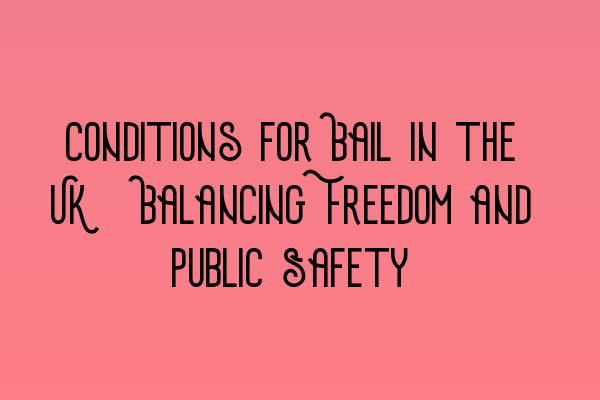Conditions for Bail in the UK: Balancing Freedom and Public Safety
Understanding the Criteria for Granting Bail and Ensuring Public Safety
When it comes to criminal law in the United Kingdom, the concept of bail plays a crucial role. Bail provides individuals who are accused of a crime the opportunity to be granted temporary freedom while awaiting trial. This allows defendants to prepare their case, consult with solicitors, and maintain their personal and professional responsibilities.
However, with freedom comes responsibility. The decision to grant bail hinges on the careful consideration of multiple factors to strike a balance between the defendant’s rights and the public’s safety. In this article, we will explore the conditions for bail in the UK and how they aim to maintain this delicate equilibrium.
One of the primary objectives of bail is to ensure that individuals accused of a crime do not pose a threat to public safety or hinder the administration of justice. The courts carefully evaluate each case, taking into account various factors when deciding whether or not to grant bail.
First and foremost, the courts assess the risk of the defendant absconding. They consider factors such as the seriousness of the offense, the strength of the evidence against the defendant, and the defendant’s ties to the community. If there is a substantial risk of the defendant fleeing, bail is likely to be denied.
Another critical factor in determining bail conditions is the risk of the defendant committing further offenses while on release. If the court believes there is a genuine risk of reoffending or interfering with witnesses or evidence, they may impose strict conditions to mitigate this risk. Examples of such conditions can include electronic monitoring, curfews, or prohibiting contact with certain individuals. These conditions aim to protect public safety while considering the defendant’s right to freedom.
The court also examines the defendant’s past criminal record. A history of previous convictions or breaches of bail may influence the decision to grant bail. However, it should be noted that each case is assessed individually, and past records alone may not be sufficient to deny bail.
The availability of suitable accommodation and a stable support network can also impact the court’s decision. If the defendant can demonstrate that they have a secure living arrangement and reliable contacts within the community, it may increase the likelihood of being granted bail. Conversely, a lack of stable accommodation or strong ties to the community may raise concerns about the defendant’s ability to comply with bail conditions and appear for trial.
Additionally, the courts consider the defendant’s personal circumstances, such as their age, health, and family situation. They take into account any vulnerabilities or special needs that may require specific conditions or accommodations while on bail. This ensures that the defendant’s rights and well-being are also protected throughout the legal process.
In conclusion, the conditions for bail in the UK are designed to strike a delicate balance between upholding individual rights and safeguarding public safety. The courts carefully evaluate each case, taking into account factors such as flight risk, potential for reoffending, past criminal records, accommodation and support networks, and personal circumstances. By considering these factors, the courts aim to make informed decisions that serve the interests of justice and maintain a harmonious society.
Related Articles:
- SQE 1 Practice Exam Questions
- SQE 1 Practice Mocks FLK1 FLK2
- SQE 2 Preparation Courses
- SQE 1 Preparation Courses
- SRA SQE Exam Dates
